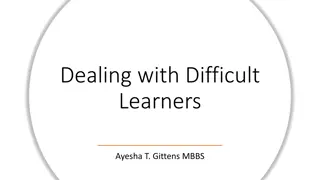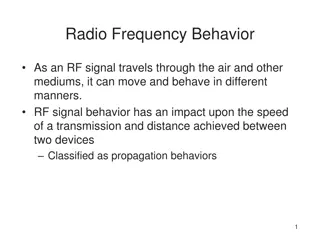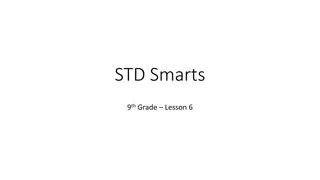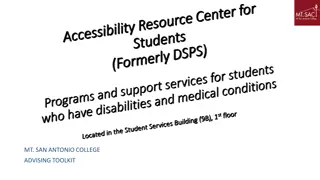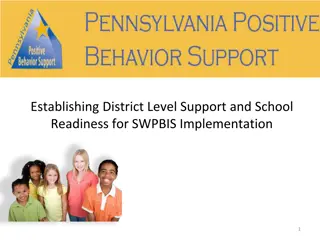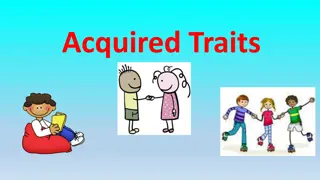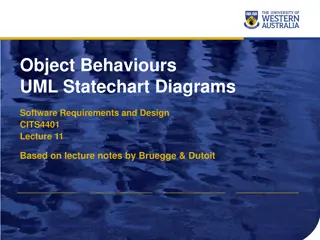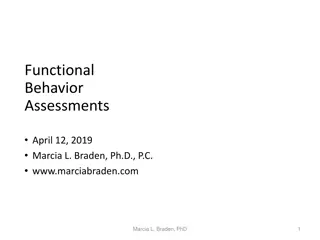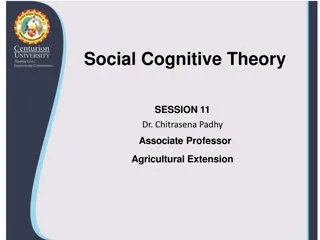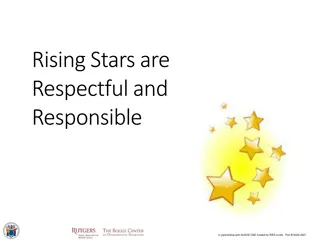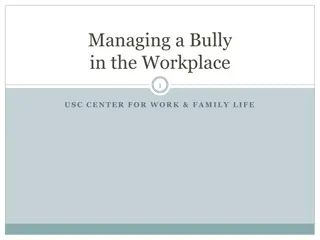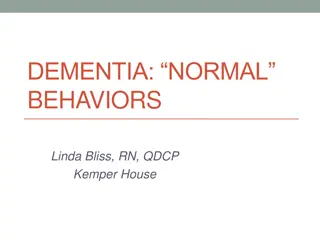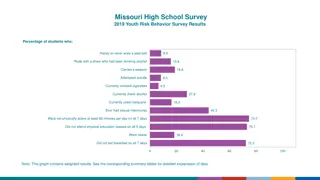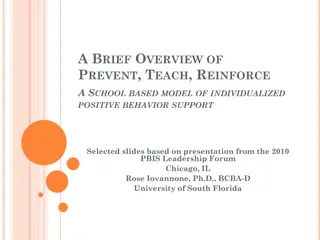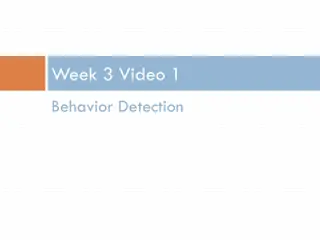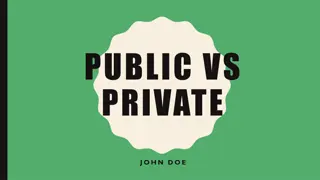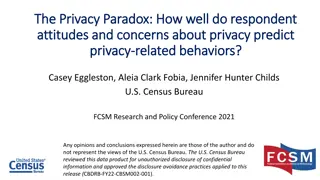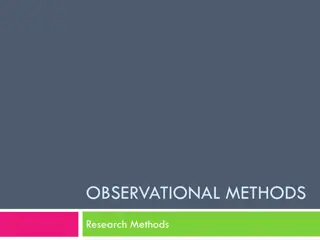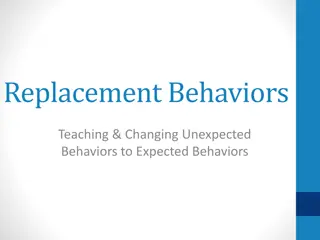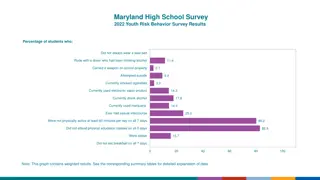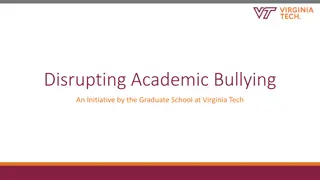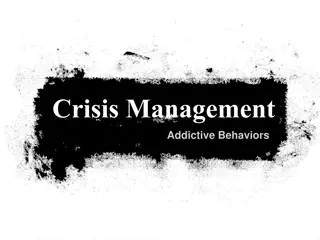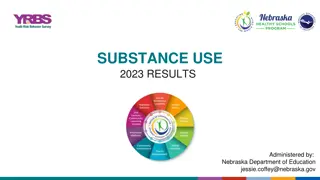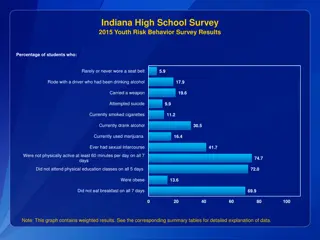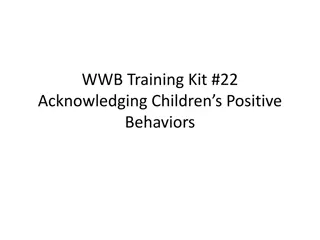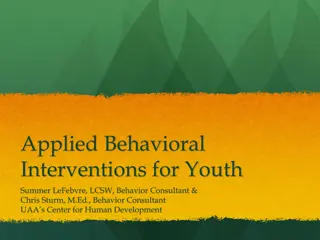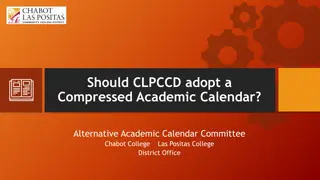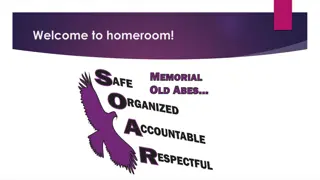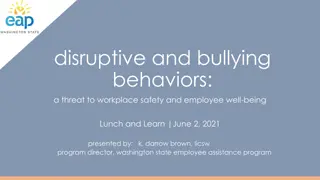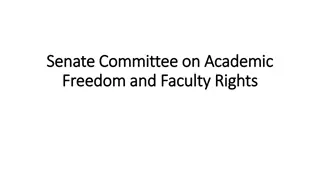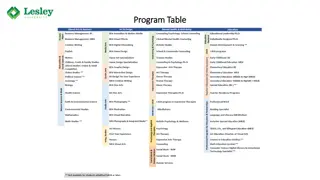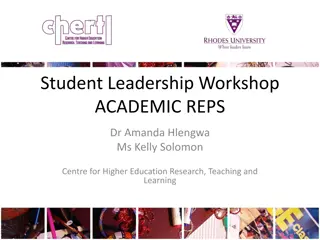Understanding and Managing Difficult Learner Behaviors in Adult Education
Dealing with difficult learners in adult education settings can impact the learning experience for all. This guide covers types of challenging behaviors, identifying underlying causes, and strategies for maintaining a constructive educational environment. By addressing disruptive behaviors effective
1 views • 32 slides
Understanding Changes in Domestic Abuse Practices Over the Last 2 Years
In the realm of domestic abuse and coercive control, there have been notable developments in practice over the past two years. From defining behaviors that constitute domestic abuse to recognizing economic abuse and the impact of coercive and controlling behaviors, the legal landscape has evolved to
6 views • 30 slides
Understanding Radio Frequency Behavior and Propagation Behaviors
Radio frequency signals exhibit various behaviors as they travel through different mediums, affecting transmission speed and distance between devices. Propagation behaviors include absorption, reflection, scattering, refraction, and diffraction, impacting wireless network performance. Understanding
2 views • 32 slides
STD Smarts 9th Grade Lesson: Risky Behaviors and STD Testing
In this 9th grade lesson on STD Smarts, students explore risky behaviors related to STD transmission and delve into the importance of STD testing. The lesson covers various scenarios and myths surrounding STDs, challenging students to consider their choices and knowledge about sexual health. Through
0 views • 32 slides
Understanding Sexual Violence and Harassment in Educational Settings
Sexual violence and harassment, including rape, sexual assault, and unwanted sexual behaviors, are serious issues that can affect anyone. This content highlights what sexual violence is, who can experience it, and the impact it has on students in educational environments. It also covers sexual haras
1 views • 27 slides
Access Center Services at Mt. San Antonio College
Mt. San Antonio College offers a range of support services through the Access Center to assist students with disabilities in accessing courses and programs. These services include academic, career, and personal counseling, assistance with academic accommodations, classes on academic strategies, and
0 views • 9 slides
Mastering Academic Writing: Strategies for Success
Academic writing is a formal style of writing with specific characteristics such as accuracy, brevity, and clarity. Understanding academic style is crucial for success in your course as it reflects your engagement with the content. Successful academic writers read, learn new vocabulary, and have a s
0 views • 23 slides
SWPBIS Implementation: Establishing District Support and School Readiness
Positive Behavioral Interventions and Supports (PBIS) focuses on creating effective environments to encourage appropriate behaviors. SWPBIS extends this approach to whole schools, applying systemic strategies to achieve positive outcomes and prevent problem behaviors. It is not a quick fix or just a
2 views • 18 slides
Understanding Multiple Baseline Designs in Behavioral Experiments
Multiple Baseline Designs are a type of experimental design used in behavioral research. This design involves measuring two or more behaviors concurrently in a baseline condition, applying a treatment variable to one behavior at a time while maintaining baseline conditions for others, and then seque
0 views • 34 slides
Managing Difficult Employees and Disruptive Behaviors
Identify common types of difficult and disruptive employee behaviors, discuss the potential impact on the organization, and offer tips for constructive management in the workplace. Explore behaviors like gossiping, incivility, bullying, insubordination, and arrogance. Understand the metrics and lega
1 views • 20 slides
Understanding Acquired Traits and Learned Behaviors in Living Organisms
Acquired traits are physical characteristics acquired during a living thing's lifetime, such as scars, and are not passed down from parents. Many acquired traits are also learned behaviors, like reading or flying, which animals develop after birth. Learned behaviors, unlike inherited instincts, are
5 views • 15 slides
Understanding Object Behaviors and Statechart Diagrams in Software Design
Object behaviors and UML statechart diagrams play a crucial role in software requirements and design. State machines, transitions, events, and states are essential concepts in modeling object behavior in response to external events. By utilizing UML statechart diagrams, one can effectively represent
0 views • 23 slides
Understanding Functional Behavior Assessments for Supporting Students
Functional Behavior Assessments (FBAs) play a crucial role in supporting students with behavioral needs by identifying the reasons behind inappropriate behaviors. This approach, led by professionals like Marcia L. Braden, Ph.D., helps define interventions, prevent problems, and teach alternative beh
1 views • 51 slides
Understanding Social Cognitive Theory: Insights from Albert Bandura
Social Cognitive Theory, developed by Albert Bandura, emphasizes learning through observation and modeling behaviors. The theory explores how individuals acquire new behaviors, thoughts, and attitudes by observing others. Bandura's famous Bobo doll experiment showcased how children imitated aggressi
6 views • 17 slides
Encouraging Responsible Behaviors in Students - Partnership with NJDOE
Promote responsible behaviors among students with engaging activities and worksheets funded by IDEA funds in collaboration with NJDOE. Students learn to arrive on time, keep track of materials, admit to mistakes, and more, fostering a culture of responsibility and accountability. Explore examples, i
1 views • 26 slides
Dealing with Workplace Bullies: A Comprehensive Guide
Workplace bullying is driven by power dynamics and can manifest through various behaviors such as sabotage, insults, and humiliation. Understanding the motivations and behaviors of bullies is crucial in recognizing and effectively managing their actions in the workplace. This guide delves into ident
2 views • 17 slides
Understanding Normal Behaviors in Dementia Care
Dementia presents a range of normal behaviors that can be challenging for caregivers. By learning to identify triggers, interpret communication, and respond effectively, caregivers can provide better support for individuals with dementia. This session explores common behaviors like aggression, wande
0 views • 29 slides
Missouri High School Survey 2019 Youth Risk Behavior Results
This survey presents key percentages and numbers of high school students in Missouri regarding risky behaviors such as seat belt usage, alcohol and drug consumption, physical activity, and more. It outlines the prevalence of behaviors like not wearing a seat belt, riding with a driver under the infl
0 views • 4 slides
School-Based Model of Individualized Positive Behavior Support
A brief overview of the Prevent-Teach-Reinforce (PTR) model presented at the 2010 PBIS Leadership Forum in Chicago, highlighting the 5-step Tier 3 support model, critical components of behavior support, team evaluation, goal setting, and operational definitions of behaviors and replacements. The mod
0 views • 24 slides
Understanding Behavior Detection Models in Educational Settings
Explore how behavior detectors automatically infer student behaviors from interaction logs, such as disengaged behaviors like Gaming the System and Off-Task Behavior, as well as Self-Regulated Learning (SRL) behaviors like Help Avoidance and Persistence. Discover the goal of identifying these behavi
0 views • 18 slides
Understanding Public and Private Spaces and Behaviors
Exploring the concept of public versus private spaces, behaviors, and activities through examples such as public places like restaurants and schools, as well as private places like bedrooms and medical offices. The content also delves into public behaviors like shaking hands and talking to people, c
0 views • 7 slides
Understanding the Privacy Paradox: Attitudes vs. Behaviors
Social scientists have identified a Privacy Paradox where individuals with strong privacy concerns may not always engage in behaviors that protect their privacy. While some studies show a discrepancy between attitudes and behaviors, others suggest that privacy-concerned individuals do employ privacy
0 views • 14 slides
Academic Integrity Board Game Overview
Academic Integrity Board Game offers a fun and educational approach to understanding academic integrity. The game revolves around values like honesty, trust, fairness, respect, responsibility, and courage, as defined by the International Center for Academic Integrity. Players set up the board, place
0 views • 4 slides
Understanding Observational Research Methods
Observational research methods involve systematic observation of behaviors and can be used in various study designs such as experimental, correlational, and descriptive research. This type of research aims to provide insights into real-world behaviors with a focus on ecological validity. The process
0 views • 14 slides
Understanding Replacement Behaviors in Behavioral Interventions
Dive into the concept of replacement behaviors in behavior modification strategies. Learn how to identify, teach, and implement expected behaviors to replace unwanted actions. Discover the role of the Child Study Team in developing action plans, prioritizing behaviors, and evaluating progress. Explo
0 views • 30 slides
Maryland High School Survey 2022 Youth Risk Behavior Results
The Maryland High School Survey 2022 Youth Risk Behavior Results provide insights into students' behaviors. Key findings include percentages and numbers of students who engage in risky behaviors such as not wearing seat belts, riding with drivers who drink alcohol, carrying weapons, attempting suici
0 views • 4 slides
Understanding Bullying Behaviors and Impact: Review and Reflection
Explore the concepts of respectful and disrespectful behaviors, bullying characteristics, who is more likely to be bullied, reasons behind bullying, and the lasting impact of bullying through a review and reflection session. Delve into Mr. Palm's story to understand the profound impact of bullying b
1 views • 23 slides
Understanding and Addressing Academic Bullying in Educational Settings
Academic bullying involves intentional, repetitive, and hostile behavior that creates a threatening environment leading to psychological and physical harm. This initiative by the Graduate School at Virginia Tech aims to disrupt academic bullying by identifying types of bullying, defining roles, and
1 views • 13 slides
Understanding and Managing Addictive Behaviors
Exploring the roots and realities of addiction, this content delves into the traps that individuals, especially teenagers, can fall into. From crisis management to the impact of addictive behaviors on mental and physical health, the content sheds light on the dangers and consequences of various addi
0 views • 15 slides
Nebraska Youth Risk Behavior Survey 2023 Results Overview
The Nebraska Youth Risk Behavior Survey (YRBS), administered biannually since 1991 by the Nebraska Department of Education, provides insights into various health-related behaviors among high school students. The survey monitors behaviors such as alcohol and drug use, tobacco use, unhealthy dietary h
0 views • 64 slides
Indiana High School Survey 2015 Youth Risk Behavior Results
The Indiana High School Survey 2015 provides valuable insights into the risk behaviors of high school students in Indiana. The survey results reveal concerning percentages of students who engage in behaviors such as not wearing seat belts, riding with drivers who have consumed alcohol, carrying weap
0 views • 4 slides
Welcome to StFX: An Overview of Academic Excellence and Supportive Environment
StFX extends a warm welcome to all, emphasizing its location on Mi'kma'ki territory and the historic treaties. The university boasts award-winning faculty and staff dedicated to student well-being and academic growth since its founding in 1853. The current academic year presents unique challenges, b
0 views • 39 slides
Understanding Positive Behavior Acknowledgment in Children
Acknowledging children's positive behaviors is crucial for reinforcing desired behavior patterns. Positive responses help in promoting positive interactions, following instructions, proper communication, and independent self-care skills. It is important to recognize and praise positive behaviors to
0 views • 11 slides
Understanding Applied Behavior Analysis (ABA) for Youth Interventions
Applied Behavior Analysis (ABA) is a science focusing on improving human behavior by increasing desired behaviors, teaching new skills, and generalizing behaviors. ABA emphasizes observable behaviors, measurement of behavior change, and the use of interventions in various settings like classrooms an
0 views • 25 slides
Exploring a Compressed Academic Calendar: A Detailed Examination by the Alternative Academic Calendar Committee
The Alternative Academic Calendar Committee at Chabot College and Las Positas College District Office is diligently studying the potential adoption of a compressed academic calendar. With careful consideration of stakeholder input and thorough analysis of the benefits and challenges involved, the co
0 views • 10 slides
Homeroom Information and Guidance for High School Students
This homeroom session provides valuable information on the school's tardy policy, SOAR matrix, positive hallway behaviors, academic and career planning options, credit options including Project Lead the Way, transcripted credits, and AP credits. It emphasizes the importance of avoiding tardiness thr
0 views • 19 slides
Workplace Safety and Well-being Lunch and Learn Event Overview
This Lunch and Learn event held on June 2, 2021, addressed disruptive and bullying behaviors as threats to workplace safety and employee well-being. Key topics included identifying, addressing, and discussing such behaviors, along with statistics on civility in the workplace and challenges faced due
0 views • 26 slides
Senate Committee on Academic Freedom and Faculty Rights Overview
The Senate Committee on Academic Freedom and Faculty Rights (SCAFFR) plays a crucial role in addressing issues related to academic freedom, faculty rights, and academic grievances at the University of Utah. The committee investigates academic freedom issues, reviews grievances, oversees the Code of
0 views • 5 slides
University Academic Leadership Structure Overview
The university's academic leadership structure is outlined, including the Academic Council, Academic Coordinators Council, and Department Chairs. The Academic Council oversees various departments led by vice provosts and associate provosts. The Academic Coordinators Council consists of members from
0 views • 4 slides
Academic Reps Responsibilities in Student Leadership Workshop
Explore the role and responsibilities of Academic Reps in a Student Leadership Workshop led by Dr. Amanda Hlengwa and Ms. Kelly Solomon at the Centre for Higher Education Research, Teaching, and Learning. Academic Reps assist first-year students, provide mentorship, liaise with students and faculty,
0 views • 4 slides
